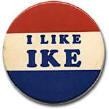The presidency of Dwight David Eisenhower spanned the years from 1953 to 1961. He was one of the most likeable presidents and even
given the nickname ‘Ike’. He knew how to control information and
America saw him as a competent leader. His administration worked to strengthen and expand Social Security and authorized
the national system of interstate highways in the Federal Highway Act of 1956. These interstates significantly cut down the
time of traveling from city to city, helped to accelerate growth in the steel and concrete industries and hastened suburbanization.
“Eisenhower obtained a truce in Korea
and worked incessantly during his two terms to ease the tensions of the Cold War.”(Dwight D. Eisenhower, pg 1) He always
emphasized world peace as a prime objective of his administration and hoped that the administrations to come would hold this
goal as high as he did.
Once in office, Eisenhower continued with Franklin Roosevelt’s New Deal policies but saw hardly any need for any further
reforms. He decided to revitalize American cities in hopes of economic development. Run down areas of towns were demolished
and luxurious office building and sports centers took their place. His administration also instituted the Federal Highway
Act of 1956. This act provided federal funding to build a nationwide system of interstate and defense highways. He believed
it was necessary to the security of America during the cold war and also thought larger cities could become targets in future
wars. These highways would allow military personnel to move in after cities were evacuated.
These investments also rapidly accelerated other industries such as the concrete and steel industries. The number of
people employed grew along with these industries. (Goldstein, pg 885)
Like the American people, Eisenhower agreed that ending the Korean War was one of the most
important obstacles to be tackled. He also wanted to stabilize relations with China. Instead of sending more U.S. forces to
China, he instead decided to move atomic bombs to the city of Okinawa, which was only four hundred miles from China. A truce
was the consequence of the high cost of war along with the nuclear threat. He also made great efforts to reduce tensions with
the Soviet Union numerous times. However, an incident involving the capture of an American pilot only set back any progress
that had been made. Soviets shot down an American U-2 spy plane on May 1, 1960. The United States had sent out spy planes
numerous times before. The Soviets at first complained, and then stopped. The Americans misinterpreted their silence as acceptance.
(Goldstein, pg 890) Eisenhower refused to apologize which angered the already
sensitive Soviets.
“General Eisenhower's popularity among the American people as a military hero, having
commanded his country's troops through Europe during World War II, has now been translated into votes.”(1952 : Landslide
…, p 1) He entered office with the most popular votes ever recorded for a candidate. His heroic legacy gave him advantages
in both his first election and then again in his second. The American people were happy with his leadership and did not hesitate
to reelect. He was a competent yet a laid- back individual. (Homecoming,
pg 1) He was wise in his ways of controlling what the public did and did not hear.
He opted to confuse people rather than answer their questions outright. (Goldstein, pg 890) This way, he always left the opposition
perplexed. He was given the nickname Ike and is forever remembered that way.

The likeable Dwight Eisenhower was
a successful president. He charmed the people and his wartime service earned him a place in the hearts of many. Maintaining
peace was a primary objective of his presidency. He secretly traveled to Korea in hopes of bringing peace to that warring
nation, risking his own safety. Eventually, a truce was signed but Korea lay divided.
He also attempted to ease tensions with the Soviet Union but the capture of an American pilot made it near impossible.
The pilot was a spy that had been shot down by the Soviets. Eisenhower refused to apologize and it enraged the Soviets who
already harbored a feeling of inferiority. Despite his gains and losses in the area of foreign affairs, he was always thinking
about how to better America. He put into place the Federal Highway Act of 1956, which allowed for the building of interstate
and defense highways. He had the safety of the people in mind. Large cities could become targets in future wars and with these
highways, cities could easily be evacuated and military personnel could quickly move in. These highways would also significantly
reduce travel time. These investments spurred rapid growth in other industries. The concrete and Steel Industries greatly
benefited from this task. The need for these highways comes hand in hand with the need for workers. Workers are needed to
make the materials, design the layout and partake in the construction aspect of it. The public didn’t seem to care too
much that Dwight never gave a straight answer. He had helped the economy in numerous ways, who could really complain? He would
confuse his opponents with his beat around the bush tactics. He successfully controlled what the American people heard. He
knew exactly what he was doing and knew the power of information. Maybe it was a bit sneaky, but that’s exactly why
they liked Ike.
Works Cited
“Dwight D. Eisenhower.” The White House. 2 pages. Online. Internet. 1 June 2007. Available.
http://www.whitehouse.gov/history/presidents/de34.html
Goldfield, Abbott,
Anderson, Argersinger, Barney, Weir. The American Journey; A History of the United States. Upper Saddle River, New
Jersey: Prentice Hall, 2001:885-890
“Homecoming.” Time. 9 pages. Online. Internet. 2 June 2007. Available.
http://www.time.com/time/magazine/article/0,9171,859682-1,00.html
1952:
Landslide victory for Eisenhower. British
Broadcasting Company. 2 pages. Internet. 1 June 2007. Available. http://news.bbc.co.uk/onthisday/hi/dates/stories/november/5/newsid_3783000/3783245.stm



